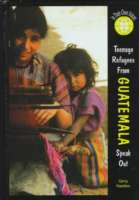
Teenagers from Guatemala describe why they left that country and how they have adjusted to life in their new homeland.

Teenagers from Guatemala describe why they left that country and how they have adjusted to life in their new homeland.
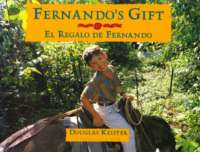
In the rain forest of Costa Rica, a boy named Fernando lives with his family in the tin-roofed house that his father has built. He picks bananas right off the tree outside his door and swims in the river nearby. When Fernando finds his favorite climbing tree cut down, he learns that not everyone has respect for the beautiful forest. Full-color photos.
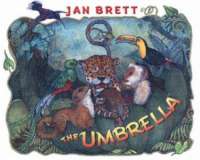
A walk through the Costa Rican cloud forest provides a wonderfully lush setting for Jan Brett’s beloved animal illustrations. When Carlos drops his umbrella to climb a tree for a better view of the animals, they all cram into the banana-leaf umbrella as it floats by–from the little tree frog to the baby tapir to the big jaguar and more. It gets so crowded in the umbrella that there isn’t even enough room for a little hummingbird! So over the umbrella tumbles, everyone falls out, and poor Carlos comes back wondering why he didn’t see any animals all day.
In the spirit of Jan Brett’s The Mitten and The Hat, this cheerful tale of escalation will have readers poring over every illustration for the world of details Jan packs in. With its classic story, exotic jungle setting, and brilliantly colorful menagerie, The Umbrella is sure to take its place among Jan’s many family favorites.
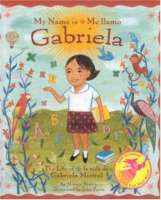
Gabriela Mistral loved words and sounds and stories. Born in Chile, she would grow to become the first Nobel Prize-winning Latina woman in the world. As a poet and a teacher, she inspired children across many countries to let their voices be heard. This beautifully crafted story, where words literally come to life, is told with the rhythm and melody of a poem. The second in Luna Rising’s bilingual storybook biography series. My Name is Gabriela/Me llamo Gabriela is beautiful tribute to a woman who taught us the power of words and the importance of following our dreams. The story of Gabriela Mistral will continue to inspire children everywhere.
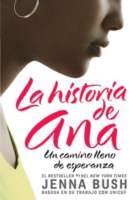
La historia de Ana comienza el día en que nació afectada con el VIH, virus que le transmitió su joven madre, quien muere pocos años después. Desde entonces, la infancia de Ana es una maraña de secretos—secretos sobre su enfermedad, su familia y los abusos que ha sufrido—. Arrastrada de una casa a otra, difícilmente encuentra seguridad o aceptación. Mas cuando se enamora y se embaraza a los diecisiete años, inicia una jornada que la conducirá a un nuevo comienzo, nuevas penas y una nueva esperanza.
Basada en su trabajo con UNICEF e inspirada en la vida de una chica que conoció personalmente, Jenna Bush narra la historia de muchos niños del mundo que viven marginados y excluidos de lo más elemental: cuidado, apoyo y educación. Al final del libro encontrarás una serie de recursos que te indican cómo puedes ayudar a cambiar la situación de niños como Ana y cómo puedes protegerte a ti y a los demás.
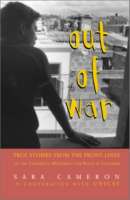
Through nine intimate first-person narratives, Out of War tells the story of the Children’s Movement for Peace, a network of organizations struggling against the forty-year civil war in Colombia. Readers will meet young people like Juan Elias, who decided he could best avenge his father’s murder by fighting to end the war; Maritza, who found refuge in the peace movement after her family and friends abandoned her in the communas of Medellin; and Beto, who works for the peace he never had in his abusive home. The voices of these children are raw and real, and their stories are nothing short of inspirational. In 1996, the Children’s Movement for Peace helped organize the Children’s Mandate, a referendum on children’s rights in Colombia. Two million children turned out to vote for their right to peace, sending the Colombian government a powerful message about its inability to control the violence within its borders. Since then, the Movement has worked to help children cope with loss, displacement, poverty, and other effects of the war. It has also taught children how to resolve conflict without fighting. The movement’s work is impressive, yet Out of War is really about the individual children who lead the group. Through them, readers will learn not only about the tenuous life of children in Colombia, but about what it means to give back to your community and face adversity with true courage and hope.
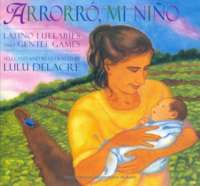
A bilingual recording of the selections in Arrorró, Mi niño, the award-winning collection of traditional Latino baby games and lullabies from fourteen Spanish-speaking countries.
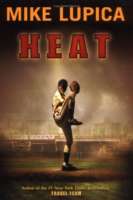
Michael Arroyo has a dream of pitching in the Little League World Series, and a pitching arm that throws serious heat. But that firepower is nothing compared to the heat Michael faces in his day-to-day life. Newly orphaned after his father led the family’s escape from Cuba, Michael has no one to watch out for him except his older brother Carlos, who is only 17, and if Social Services hears of the boys situation, they will be separated in the foster care system-or even worse, sent back to Cuba. So the boys their best to carry on alone, dodging bills and anyone who asks to many questions. Until, that is, someone questions how a 12-year-old boy could possibly throw with as much power as Michael Arroyo throws and Michael has no way to prove his age, no birth certificate, and no parent to fight for his cause. Suddenly Michael’s secret world is blown wide open-and he discovers that family can come from the most unexpected sources. A baseball and coming-of-age story worth cheering for, culminating in a dream come true for any boy: Michaelm poor orphan of the Bronx, NY, steps onto the most hallowed of spaces-the Yankee stadium pitching mound.

Describes, in text and photographs, the vanishing culture of the Yanomama, a primitive group that lives in the Amazon Territory of Venezuela.

A polar bear reassures a cub by describing what a polar bear is and does, and promising to lovingly teach such necessary skills as hunting and walking securely on ice.